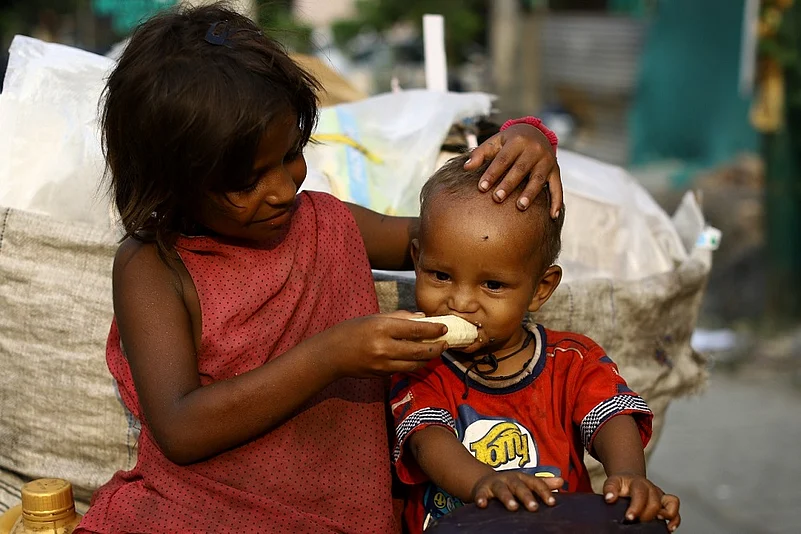India’s dynamic journey to find solutions for addressing malnutrition could benefit from research-based recommendations from nutrition experts, believes Ram Mohan Mishra, Secretary, Ministry of Women and Child Development. He was co-chairing the closing session of the third India-focused implementation research conference “Delivering for Nutrition in India: Insights from Implementation Research”, 14-18 September 2020, which focused on taking stock of available implementation-focused evidence to policy and programs.
“We need research to help us understand the specific questions that we policymakers have about program impact and implementation bottlenecks,” said Ms. Anu Garg, Principal Secretary, Women & Child Development, Odisha, adding to the call for a prioritized implementation research agenda to help strengthen POSHAN Abhiyaan’s impact. R. Prasanna, Principal Secretary, Women & Child Development, Chhattisgarh, noted that state governments also needed locally grounded networks of researchers to support their knowledge needs. Moderated by Dr Junaid Ahmad, the closing panel brought together researchers and policymakers. The World Bank Country Director in India, Dr Junaid Ahmad, noted in his remarks that “nutrition is now recognized as central to national development and economic growth and India’s efforts to move this agenda in the last few years have been exemplary; implementation research can help close gaps and move this agenda even faster.”
“It is an unprecedented time for nutrition in India when measured against what it will take to scale-up nutrition,” said Dr Purnima Menon, Senior Research Fellow, International Food Policy Research Institute (IFPRI) , and conference co-chair, who presented the closing summary. She noted that India has a clear vision and goal and leadership for nutrition, and that POSHAN Abhiyaan includes high-impact interventions for delivery through multiple program platforms. There are also several champions, catalysts and enablers for this nutrition agenda and systemwide ownership. However, to help achieve full-scale coverage and quality of interventions, she said, adding that contextually relevant pathways for scaling-up these interventions are needed. This in turn requires operational and strategic capacities and conducive governance mechanisms, including adequate and stable financing for delivering these interventions. Finally, mechanisms that enable program learning and accountability are also required.
The conference brought together evidence-based insights to help the mission achieve its goals. This conference was co-hosted by 19 organizations, including the International Food Policy Research Institute (IFPRI), the National Institute of Nutrition, India’s premier nutrition research institute and NITI Aayog, India’s national policy think-tank. A total of 51 abstract-based oral and 56 poster presentations were programmed under 12 carefully selected themes. Researchers shared science-based update on tackling various nutrition outcomes, such as stunting, wasting and anaemia. Researchers and implementers together examined evidence on multiple causes of malnutrition, including maternal, infant and young child nutrition behaviour and household diets.
Findings on implementing a range of interventions such as food supplementation, micronutrient supplements, cash transfers, behaviour change, and actions in food systems were also discussed. Four conference sessions focused on key delivery platforms, like the Integrated Child Development Services, health systems and women’s group platforms, including on efforts to strengthen those systems using technology, data, and building capacities and infrastructure. Insights were also shared on what it would take to achieve convergence of interventions on every mother-child dyad. And finally, a session showcased merging research on delivery of nutrition services during the COVID-19 pandemic.
Global experts, including Prof. Margaret E. Kruk from Harvard T.H. Chan School of Public Health, Prof. Zulfiqar Bhutta from SickKids and the University of Toronto, Dr Marie Ruel and Dr Jef Leroy from International Food Policy Research Institute, shared findings from their pioneering research in the areas of building quality health systems, role of food supplements and child growth, respectively. They were joined by national experts such as Dr Rajani Ved, Prof. Harshpal Singh Sachdeva, Dr Ranadip Chowdhury, Dr Rajan Sankar and Dr Shariqua Yunus.
At the inaugural session, on September 15, 2020, the India Nutrition Implementation Research Gap Map was launched by International Initiative for Impact Evaluation, one of the co-hosts of the conference. This gap map will help in setting priorities for future research and identifying high priority implementation research questions to address the gaps. Responding to a question by Junaid Ahmad, Country Director, World Bank, on research priorities, D. G S Toteja from the Indian Council of Medical Research highlighted the need for locally relevant research to strengthen the nutrition efforts of states and districts in India.
Dr Arjan de Wagt, chief of nutrition, UNICEF India, emphasized that the nutrition community in India should continue rallying its efforts to support POSHAN Abhiyaan and ensure that the programs and policies stay focused on delivering nutrition, even amidst the COVID-19 pandemic. And finally, Dr Chandrakant Pandav, a member of the National Technical Board on Nutrition, noted that the coming together of researchers to contribute their knowledge to the nutrition mission, was unprecedented.
“We need to keep working together to create stronger research and program community linkages and to identify research funding mechanisms for this important agenda,” concluded Dr Purnima Menon, who closed the conference.


























